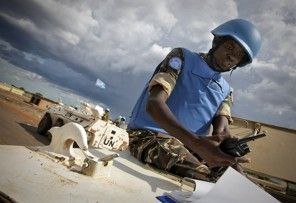Sudan has rejected a call by the U.N. Security Council to withdraw its forces from the contested town of Abyei, as internal pressure mounts on South Sudan to respond to the invasion last month.
Sudanese Foreign Minister Ali Ahmed Karti, in a statement released over the weekend, said that Abyei is “Sudanese territory,” referring to the border region as well as the town by the same name it seized May 21.
For South Sudan’s leadership, the question of how to respond is politically fraught as it balances competing domestic demands to react and international pleas for restraint. The attack comes just weeks before South Sudan becomes an independent nation July 9, a culmination of decades of armed struggle against the north in which an estimated 2 million southerners died.
The seizure of Abyei derails the full implementation of a 2005 peace agreement, which ended the 22-year Sudanese civil war, and the United States and several other countries have expressed concern that the breach could escalate into the resumption of war.
Abyei, a fertile border region roughly the size of Connecticut, is used by two populations. The Ngok Dinka, non-Arab subsistence farmers who reside permanently in Abyei, believe the land should be part of South Sudan when Sudan splits into two countries on July 9. The Misseriya, Arab nomads who pass through Abyei in the dry season to graze their cattle, believe that Abyei is northern land.
The dispute was supposed to be resolved through a referendum that never took place because of a failure to agree on who was eligible to vote.
Ngok Dinka say the Sudanese government’s attack began with Antonov aircraft bombing and was followed by a ground assault. According to the U.N. figures, an estimated 80,000 civilians have been displaced as a result.
The U.N. Security Council’s demand that the northern-based Sudanese government withdraw its forces from Abyei came on the heels of a confidential U.N. report, leaked to the Associated Press on Friday, that warned that Khartoum’s seizure of Abyei “could lead to ethnic cleansing, if conditions for the return of the displaced Ngok Dinka residents are not created.”
Despite significant oil deposits, South Sudan has some of the world’s poorest development indicators. Observers say the support of Western donors, who are urging restraint over the Abyei situation, will be crucial for the soon-to-be new country.
But the Ngok Dinka and many of South Sudan’s senior leaders are pressing the region’s president, Salva Kiir, for a robust response.
“The leadership in Juba is being pressured by the West to stand down, but pressure from within for action is mounting,” said a U.S. official working closely on the situation.
Kiir has so far maintained that his forces will not react, calling instead on the international community to respond. But many people from Abyei are skeptical.
Sudanese President Omar al-Bashir “is immune to all these international pressures,” said Deng Alor, an Abyei native and South Sudan’s minister for regional cooperation.
Western analysts says Kiir’s decision not to engage the South Sudan army, known as the SPLA, may be driven by practical constraints as much as any strategic calculation. Just six years ago, the southern army was a collection of rebel fighters. Despite significant support from Western nations, including the United States, southern army spokesman Philip Aguer acknowledges that “we are still in the process of making the transformation from a guerrilla group.”
But according to South Sudan’s General Army Chief of Staff, Lt Gen James Hoth Moi: “If it comes to war, we have that capacity.”
